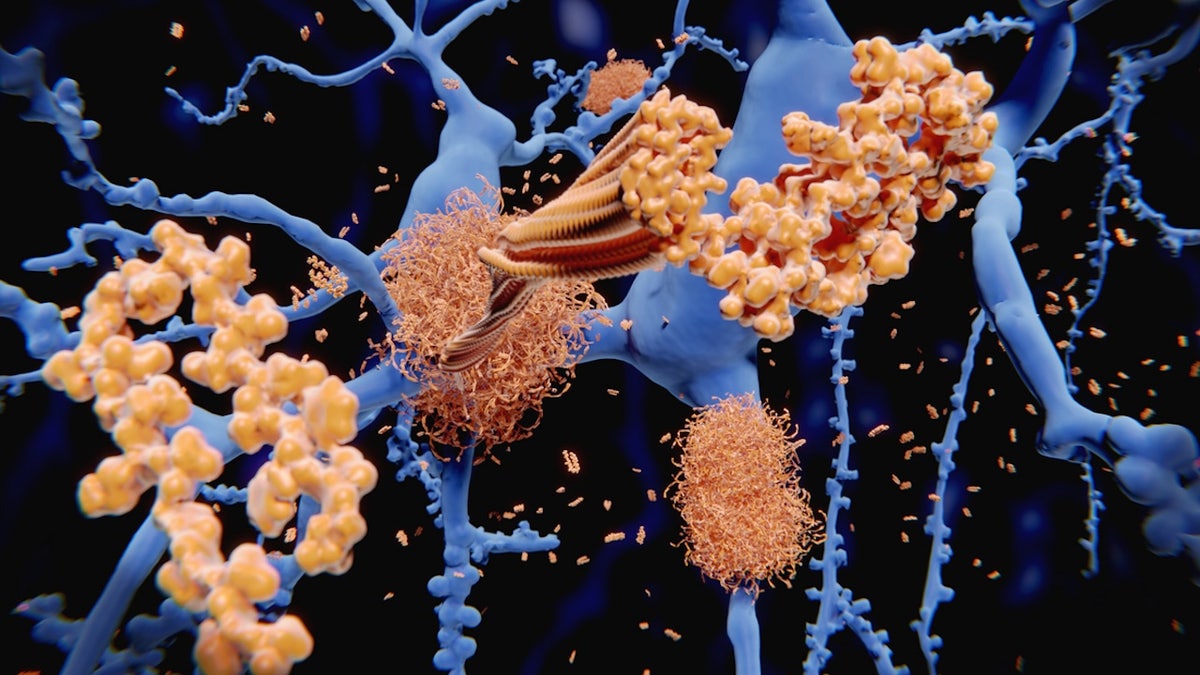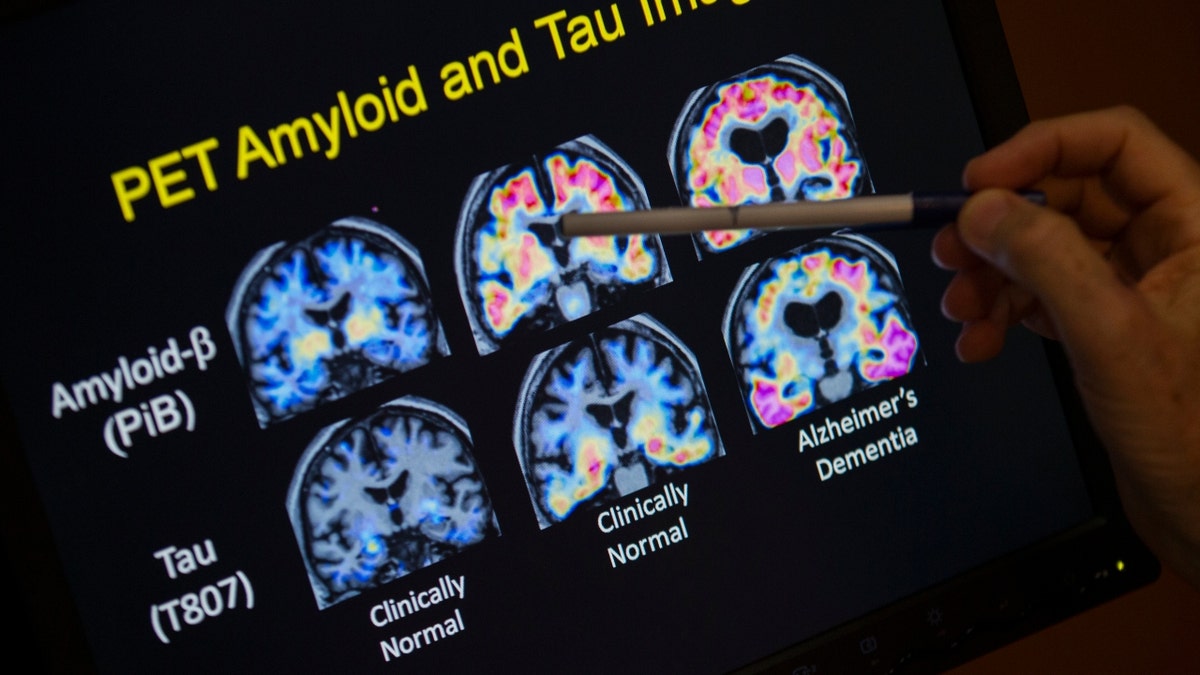Having a mother with Alzheimer’s could lead to a higher risk of inherited disease than a paternal history.
That’s according to a recent study from Mass General Brigham. Researchers analyzed 4,400 adults between ages 65 and 85 who did not have any signs of cognitive decline, but did have amyloid show up in brain-imaging scans.
The people with the higher amounts of amyloid were more likely to have mothers with symptoms of Alzheimer’s — primarily memory loss, the researchers found.
ALZHEIMER’S CAREGIVER HANDBOOK: HERE ARE EXPERT TIPS AND TECHNIQUES FOR THOSE WHO TEND TO DEMENTIA PATIENTS
Amyloid, a protein that builds up in the brain and forms plaques that affect cognitive function, is one of the hallmarks of Alzheimer’s disease (AD).
The findings were published in JAMA Neurology in June.
“Our study showed a striking asymmetry in the impact of maternal versus paternal history of dementia on the risk of offsprings’ brain amyloid-beta protein accumulation, with maternal history having a greater impact,” senior corresponding author Hyun-Sik Yang, M.D., a neurologist at Mass General Brigham, told Fox News Digital via email.
“In our study, maternal history of dementia increased their children’s risk of having preclinical AD, while paternal history had less impact.”
FDA APPROVES NEW DRUG FOR ALZHEIMER’S DISEASE: ‘MEANINGFUL RESULTS’
The researchers — a collaborative team from Mass General Brigham, Vanderbilt and Stanford — expected to see similar genetic risks to be passed down by mothers and fathers, Yang noted.
“Our results suggest otherwise, raising intriguing questions about AD genetics and how AD risk is inherited,” he said.

The participants in the study had what is referred to as “preclinical Alzheimer’s disease,” Yang noted, which occurs when there is amyloid buildup but no symptoms.
“This stage might represent a unique opportunity to treat AD before it irreversibly destroys the brain,” he said.
The researchers also found a correlation between amyloid buildup and a history of Alzheimer’s on both sides of the family, as well as fathers with early-onset dementia.
“It’s interesting from a genetic perspective to see one sex contributing something the other sex isn’t.”
“If your father had early onset symptoms, that is associated with elevated levels in the offspring,” said Mabel Seto, PhD, first author and a postdoctoral research fellow in the Department of Neurology at the Brigham, in a press release.
“However, it doesn’t matter when your mother started developing symptoms — if she did at all, it’s associated with elevated amyloid.”
IN ALZHEIMER’S BREAKTHROUGH, RESEARCHERS IDENTIFY ‘PROTECTIVE GENE’ THAT DELAYS DISEASE IN HIGH-RISK FAMILY
Women are nearly twice as likely to develop Alzheimer’s than men, according to data from the Alzheimer’s Society.
“It’s really interesting from a genetic perspective to see one sex contributing something the other sex isn’t,” Seto said.
Limitations of the study
Courtney Kloske, PhD, director of scientific engagement at the Alzheimer’s Association in Chicago, Illinois, was not involved in the study but shared her insights on the findings.
“This study sheds light on the interplay between genetics and cognition in individuals with a family history of cognitive decline,” Kloske told Fox News Digital in an email.

The expert did point out some limitations in the study, which the researchers also acknowledged.
“The authors mention that their findings should be interpreted cautiously,” she said.
One key limitation was that the study participants self-reported their family history, which could introduce some degree of bias or inaccuracy.
ALZHEIMER’S BLOOD TEST ACHIEVES FASTER DIAGNOSES, HIGH ACCURACY AT MAYO CLINIC
“Additionally, the generally longer lifespan of women compared to men may contribute to the higher observed prevalence of cognitive impairment among women,” Kloske added.
Yang also spoke to this limitation, adding that the study participants were older adults and that the average life expectancy was shorter in their parents’ generation, especially for males.

“That might have made it even more challenging to assess the actual risk of dementia in their fathers, as they might have passed away before getting to the age when dementia becomes more prevalent,” he said.
Another consideration, according to Kloske, is that the parents in the current study lived in a “different, earlier era” when women were less likely to be in the workforce and had lower levels of education.
CLICK HERE TO SIGN UP FOR OUR HEALTH NEWSLETTER
“These trends limit the generalizability of these results,” she said.
Yang also reiterated that none of the study participants had dementia — “we asked about their family history and matched them with the amyloid PET scan results.”
While having elevated amyloid levels significantly increases the risk of someone eventually having dementia, Yang noted, more research is needed to determine the full impact of family history on the course of Alzheimer’s disease.

“We think it is important for doctors evaluating dementia patients to gather detailed family history information, including the history of both parents and their age at onset if there was a memory loss or dementia history,” he said.
It is also important to seek out ways to decrease the risk, especially if someone has a family history, according to the researcher.
For more Health articles, visit www.foxnews/health
“Lifestyle and environmental factors are thought to play a significant role in dementia risk,” Yang said.
“I always tell my patients to focus on a healthy lifestyle, such as a heart-healthy diet, regular physical activity, and a socially and intellectually active lifestyle.”
Read the full article here











